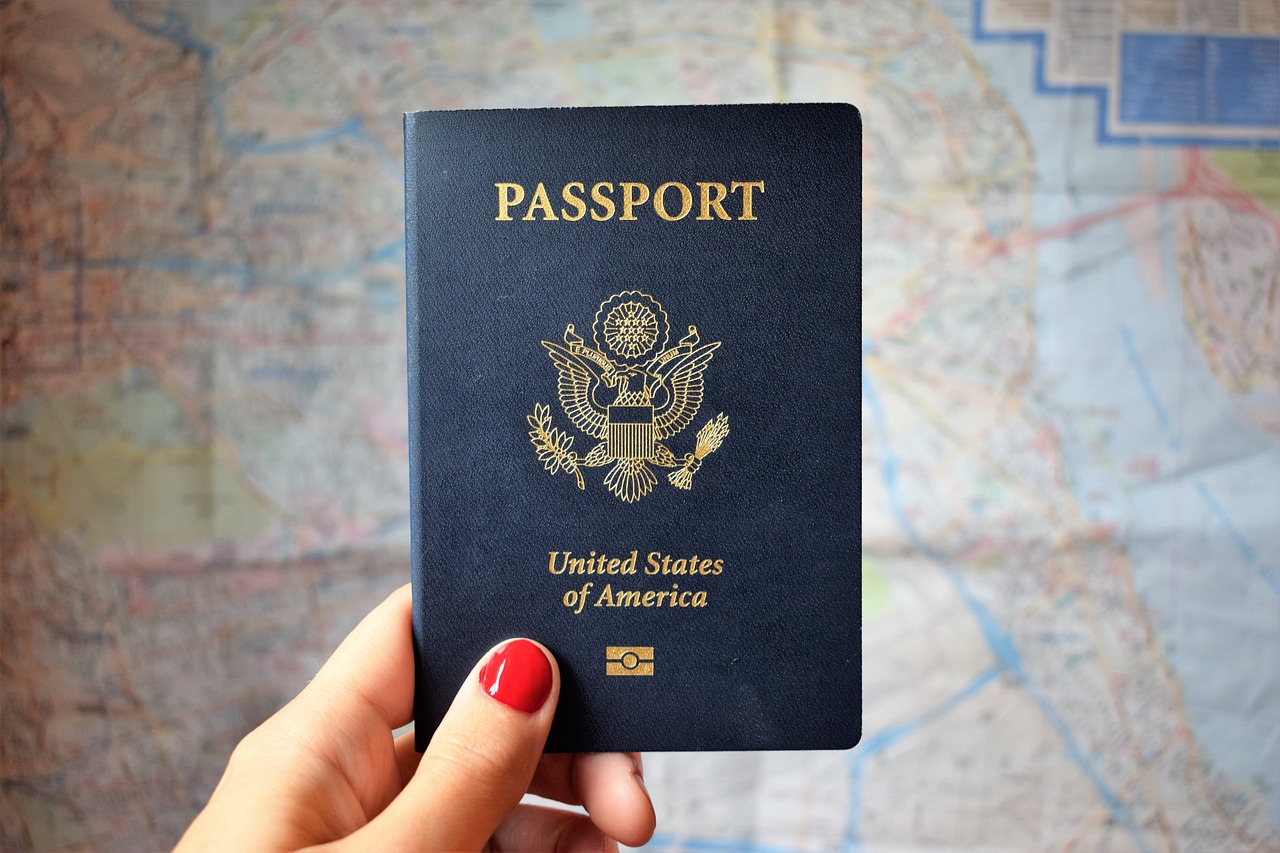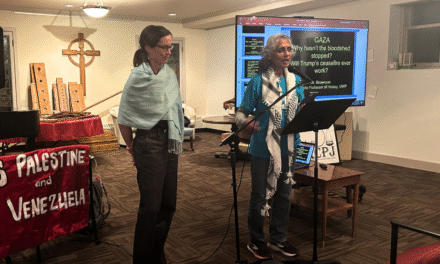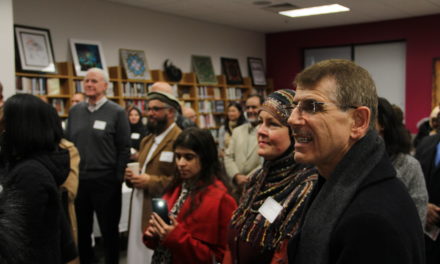
This article is Part One of a two-part series about how Milwaukee Muslim Women’s Coalition’s Our Peaceful Home and End Domestic Abuse Wisconsin have joined forces to call attention to and provide resources and training to end a newly identified form of domestic abuse—transnational marriage abandonment.
Until Madison-area attorney Kelsey Mullins, J.D., M.S.W., was contacted by an advocate for survivors of domestic abuse about a case of transnational marriage abandonment, she had never heard of it.
In her two years of practicing with End Domestic Abuse Wisconsin, a statewide coalition of social policy advocates, attorneys and experts working to end domestic abuse, no one had mentioned it. In the year she interned at RISE Law Center, assisting in direct representation of immigrant domestic abuse survivors, it never came up.
“I also worked with immigrants in other fields: adult basic education, teaching, and community-based social work for a total of maybe five years,” and never heard of it, Mullins told Wisconsin Muslim Journal. “I took lots of family law classes, and it never came up there!” she exclaimed. “It also never came up in my social work program.” (Mullins has a law degree and a master’s degree in social work, both from the University of Wisconsin-Madison.)
Then, in the summer of 2021, Mullins received a call from Basema Yasin, coordinator and advocate of Our Peaceful Home, a culturally specific domestic abuse program provided by the Milwaukee Muslim Women’s Coalition. Yasin told her about a woman left abroad by her husband without any means of returning to the United States.
“And there were children involved,” Yasin told WMJ. “There are always children involved. Husbands want to abandon their wives in other countries, trying to bypass American family court laws where they would have to split marital assets as well as pay child support.”
“I was stunned by the facts she was telling me,” Mullins recalled. “And she was surprised that I was surprised.”
Yasin “rattled off more than three situations,” said Mullins, “where someone with citizenship or lawful permanent residence married someone in a country they had cultural connections to, lived in the United States, had lives in the community, had children here and, then after years of abuse, the husband would abandon the survivor in that person’s country of origin.
“Now that I’ve dug into it, I know that it happens all the time,” Mullins said.
Since that first conversation, MMWC’s Our Peaceful Home and End Domestic Abuse Wisconsin have collaborated to raise awareness of transnational marriage abandonment and connect women who experience this type of abuse to information and resources.
Naming the problem
Mullins isn’t the only one who had not heard of international marriage abandonment. “I think a lot of people haven’t heard it,” Mullins said. “Even those who have heard about it or met survivors don’t know it’s such a broad phenomenon.”
Or that it has a name.

Attorney Kelsey Mullins practices with End Domestic Abuse Wisconsin in Madison.
“Naming it helps,” Mullins said. Transnational marriage abandonment is defined as a type of abuse in which an abuser abandons the victim-spouse in their country of origin, without means to return to the United States, Mullins explained in her Nov. 11 article in Wisconsin Lawyer, Highlighting a Hidden Legal Issue: Transnational Marriage Abandonment. “The abuser, who is usually a U.S. citizen or lawful permanent resident, then has sole access to shared children who remain in the United States and all the couple’s assets.”
“People don’t necessarily put a name to it,” Mullins noted in an interview last week. “The survivors are very disenfranchised by victimization, by abandonment, sometimes by lack of immigration status, sometimes by difficulty with communication once they’re in another country.
“They’re typically not reporting this and no one is really tracking it that we know of,” she added.
“Previously when survivors were abandoned in their home country, they weren’t going to have very many options for contacting a lawyer or an advocate in the community in the U.S. where they had lived,” Mullins continued. “But now, with cell phones, WhatsApp and websites for these advocacy agencies, I think survivors are finally able to get in touch with someone who might recognize their experience and be able to offer assistance.
“My guess would be that it’s been happening under the radar for decades, for as long as people have been able to marry someone from another country and bring them back to the U.S.”
Identifying the problem is the first step towards solving it, Mullins said. It can be helpful for attorneys and advocates to know this is becoming an accessible form of power and control for abusers to leverage.
Partnering to prioritize the Transnational Marriage Abandonment issue
Since 2021, End Domestic Abuse Wisconsin and Our Peaceful Home have joined forces to prioritize this once hidden issue.
At End Domestic Abuse Wisconsin, “we provide technical legal assistance—information, explanation of statutes and how to understand them, overviews of court processes” and other resources, Mullins explained. “For example, we have a legal manual that’s going to have information about, let’s say a divorce, or how to serve someone papers to begin a divorce.
“We have materials that can walk advocates through the steps to guide a survivor in their legal case. Basically, what we’re doing is bridging the gap for survivors who don’t have an attorney. I can’t represent the survivor. I can’t go to court with them, but I can offer information to the advocate who can then better serve that survivor.”

For its part, Our Peaceful Home provides culturally informed education about domestic abuse, safety planning, intervention, emergency housing and advocacy, as well as qualified interpreters for victims and survivors of abuse. It has specific expertise with Muslim immigrants and refugees but offers services to all.
Together, they are able to connect women who experience domestic abuse with resources and information, as well as raise awareness of the issue among advocates for victims and those working in the justice system.
A pervasive issue
“An agency like Milwaukee Muslim Women’s Coalition is really excellently positioned to help (Muslim) survivors from this culturally specific group,” Mullins said. “But what about other culturally specific agencies? Do they recognize this is happening?”
Early in their collaboration, Mullins, Yasin and MMWC president Janan Najeeb realized this is not just a Wisconsin issue and not just a Muslim issue.
Mullins alone has provided legal technical support on six cases since she learned of it. “If I have direct knowledge of six cases of transnational marriage abandonment, there are certainly many more.

“If you search for transnational marriage abandonment plus U.K., you’ll get a slew of reports about women who were abandoned in their countries of origin,” she said. “I don’t think it’s specific to any region of the world or any particular group. Folks are being abandoned in countries of origin across the globe. I’ve seen examples from many different countries. It’s just a very pervasive issue.
“What are other culturally specific agencies seeing? Are they getting requests from survivors from other parts of the world? We decided to reach out and make sure that advocates across Wisconsin recognized this as an issue and have an understanding of how to approach it.”
See Part 2 Friday to learn what Our Peaceful Home and End Domestic Abuse Wisconsin have done so far and what they are planning to do to stop transnational marriage abandonment.













